Dengue fever is a viral infection that is spread via the bites of mosquitoes and is commonly found in tropical and sub-tropical regions.
The dengue virus is carried and spread by the Aedes aegypti mosquito. When this insect bites an infected person, it becomes a vector or a carrier of the infection and goes on to infect other humans when it bites them. Dengue cannot be spread from person to person.
People living in warm and humid climates are at an increased risk of dengue infection, especially in over crowded or poorly sanitized areas. The Aedes aegypti mosquitoes usually breed near water and may be found in stagnant pools such as in containers on building sites or in disused vehicles that have collected water. Dengue infection is also common in the cities of developing countries, where hygiene and sanitation levels are low.
Symptoms
Typical symptoms of dengue fever include:
- Fever with temperatures reaching as high as 41ºC (105.8ºF)
- Headache
- Eye pain
- Pain in the bones, muscles and joints. The back pain is characteristic of the infection.
Diagnosis
A doctor may be able to diagnose dengue fever based on symptoms and any history a patient provides about travel and exposure to mosquitoes. A blood test may be performed to check whether the virus is in the bloodstream.

Treatment
Dengue fever usually resolves within a week or two. There are no specific treatments for dengue fever, but the illness can be managed by taking paracetamol to relieve pain and fever. Ibuprofen and aspirin are not advised because they can cause internal bleeding in patients with dengue fever. Patients should also stay well hydrated and get plenty of bed rest.
In rare cases, patients go on to develop “severe dengue,” a fatal outcome that can lead to shock, bleeding and damage to the organs. Hospitalization is very important in these cases.
At present, there are no vaccines against dengue fever and individuals are advised to follow precautionary recommendations when travelling to high-risk areas. Examples of measures that can be taken include wearing protective clothing and using a mosquito repellent day and night.
Further Reading
Last Updated: Jul 21, 2023